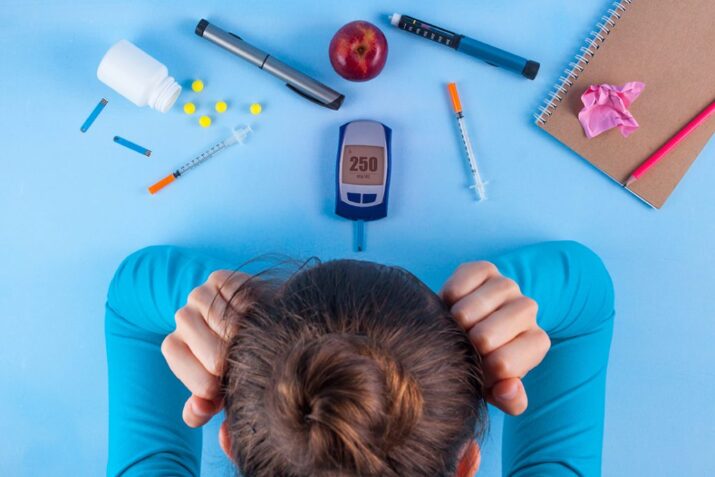In the United States, three of the most detrimental and most widespread chronic conditions are diabetes, obesity, and depression. It is found that diet is a major diabetes risk factor. Recent studies also highlighted the relevance of malnutrition as a potential risk factor for common mental disorders, particularly in elderly depression.

This short read will serve as a self-care checklist for patients dealing with diabetes and depression.
Compelling Statistics Concerning Obesity, Diabetes, and Depression
The Centers for Disease Control and Prevention estimates that about 10% of Americans are diabetic (90–95% of which have type 2 diabetes) and that roughly 7.6% of Americans 12 years of age or older may suffer from depression in any given two-week period.
The CDC also revealed that the prevalence of obesity in the U.S. from 2017 to 2018 accounted for 42.4% of the population or 138 million people.
In addition to being regarded as serious conditions in their own right, surveys show that patients who have type 2 diabetes are also prone to obesity and depression. This means that obese patients are either already diabetic or at elevated risk of becoming one. Although the relationship between obesity and depression remains a matter of analysis, some studies have found a link between them.
An Overview of Diabetes and Its Classifications
Diabetes Mellitus, commonly known as diabetes, is a term for a group of metabolic disorders that cause elevated blood sugar (glucose) levels in the body. When high blood sugar remains untreated, it damages the nerves, kidneys, eyes, and other organs.
Diabetes can cause more severe complications if not managed well. By damaging organs and blood vessels, it increases the risk of heart disease, kidney disease, vision problems, and nerve damage.
There are different types of diabetes. Here’s a breakdown of them:
➊ Prediabetes
Blood glucose levels exceed the normal range but are not high enough to qualify as diabetes
➋ Type 1
The pancreas produces no insulin.
➌ Type 2
The pancreas either doesn’t make enough insulin, or the body can’t use it effectively.
➍ Gestational
Pregnant women are unable to make and use all of the insulin they need.
Detrimental Effects of Depression in Diabetes
Diabetes is burdensome all by itself, but for a patient with diabetes to also be depressed is an utterly painful and dangerous predicament. Having diabetes can dramatically increase the odds of having problems with depression; likewise, depression can make it more difficult to manage (if not complicate) diabetes.
Scientific research has revealed that people with depression have higher tendencies to skip their medications and adopt a sedentary lifestyle and unhealthy eating habits. As a result, they have difficulty managing their weight. Worse, depression contributes directly to the following when combined with diabetes:
- Poor blood glucose control
- High risk of long-term complications such as heart disease and retinopathy
- Frequent medical consultations or visits to the hospital
- Shorter life span
Now that we’ve learned how depression is evidently toxic towards diabetic patients if left untreated, let’s discuss how to manage both conditions with a healthy diet and nutrition.
Things you can do to manage your diabetes and depression with a healthy diet and nutrition.
➤ As a Rule, Consult Your Healthcare Provider First
Prior to any intervention, you must first talk to your healthcare providers for a professional assessment of your current condition and guidance on your treatment. This includes your doctor, nurse practitioner, and registered nutritionist or dietitian. With an adequate understanding of your health status, they can greatly help you set attainable goals and safely work towards achieving them.
Additionally, you should check with them every step of the way to ensure you’re on the right track, gauge progress or response to treatment, and avoid any complications. Your own health is on the line here, so you might as well find legitimate and reliable healthcare providers for better results.
➤ Adhere to Diabetic Nutrition Guidelines
Part of diabetes management is nutrition therapy. According to clinical development consultant Alison Gray, RDN, “nutrition guidelines should be based on the dietary history of the family and the patient’s meal pattern and habits prior to the diagnosis of diabetes.”
A diabetes diet essentially means sticking to regular mealtimes and eating the healthiest food in moderate amounts. It’s a healthy eating plan that is naturally low in calories and fat yet rich in nutrients. In fact, a diabetes diet is the best eating plan for almost everyone—it’s principally comprised of vegetables, whole grains, and fruits.
➤ Eat for Your Happiness
In addition to giving us fuel to perform activities of daily living, food also helps us cope and feel much better. But not all kinds of food can be therapeutic for our mental health; some even cause more harm than good. Therefore, identifying which foods are best for depression is just as important as medication and other treatments.
The best foods for depression include turkey, avocados, berries, cashews, chamomile tea, dark chocolate, oatmeal, and more. Meanwhile, stay away from refined sugars, artificial sweeteners, soda, alcohol, margarine, potato chips, and others like these—not only are these bad for depression, they’re also deleterious for people with diabetes.
➤ Complement Your Diet with Lifestyle Changes
After all, is said and done, it still boils down to how you earnestly care for yourself. Complying with medical treatments and a healthy diet definitely help, but they’re not everything.
There’s so much you can implement in your lifestyle to promote your health, such as exercising, getting quality sleep, drinking enough water, spending time in nature, adapting different relaxation techniques, and so much more. Just remember to check with your healthcare provider and take it one day at a time.